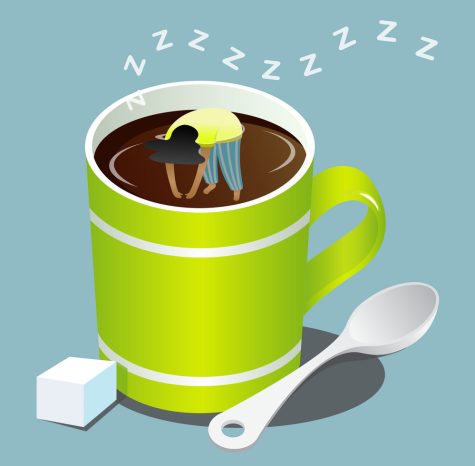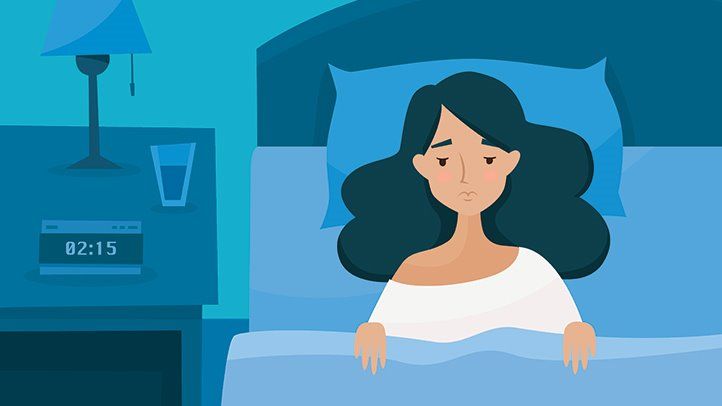Don’t Let Lack of Sleep Make You a Creep
May 17, 2022

DON’T LET LACK OF SLEEP MAKE YOU A CREEP
Imagine, after a long day of staring at a computer screen and completing numerous homework assignments, you can finally head to bed. All was well until you reach for your phone and realize that it is way later than the time you anticipated going to bed at. Nonetheless, you close your eyes and doze off in a matter of minutes. After only being asleep for a mere three hours, all of a sudden, your alarm is blaring and signaling that it’s time to wake up. With heavy eyelids and an unpleasant drowsy feeling lingering all throughout your body, you realize something: you didn’t get enough sleep. Most people have been there at least once or twice, but when it becomes constant, there is an issue at hand.

“With a good night’s sleep you are able to focus more, are overall healthier, and probably happier” Greenway chemistry teacher Ms. Kestle said. Getting good sleep most nights, if not all nights of the week, is essential to having a good day. Centers for Disease Control and Prevention, or CDC, recommends that high school students should be receiving around 8 to 10 hours of rest everyday. However, in a 2015 survey sent out across the United States, 72.7% of adolescents aged 13-18 didn’t meet the recommended amount of sleep.

According to Perri Klass’s article “The Science of Adolescent Sleep” in the New York Times it says that sleep for teens has an impact on both the health and behaviors of people, specifically teenagers.
To many, receiving less than 8 hours a night might not seem like a big deal, but the effects on health certainly show the opposite. Slumbering for less than the recommended amount can negatively affect someone’s mental health. For example, 50% of people with insomnia also have some form of depression, anxiety, or stress disorders. Scientists believe that the mental health issues in these cases stem directly from or are closely connected to sleep deprivation that disorders like insomnia cause.
One part of behaviors that can be affected is the moods of people. Freshman Abril Florxs said that she likes to get around 8 hours of sleep because she feels like she has more patience when she’s well-rested. Also, a 2015 study reported that 88% of parents notice a significant change in their children’s mood when they don’t get adequate sleep.

In addition to the impact a lack of sleep can cause on health and mood, academic performance of a student can be influenced. Greenway math teacher Ms. Marey said that if students are sleep deprived, it ends up being harder for them to comprehend the lessons and think through problems on a test. A brain needs that recharge at night to be at its full learning capacity, especially if it is still in the developmental stage.

Time management is considered one of the leading causes of people, especially students, losing sleep. “I live quite far from the school, so it takes me a while to get home. Then I have chores and house duties, but I also have to maintain time for myself and time to play my instrument, which ends up taking a few hours,” Freshman Jazmine Maddeaux said. Keeping those activities in mind, plus additional tasks like eating dinner, doing homework, and spending time with others, it can be very hard to get to bed at an early enough hour to where someone can feel energized in the mornings.

In order to combat the loss of sleep, napping may seem like it’s an effective solution. This raises the question of whether or not they actually help fix the issue of sleep deprivation. Freshman Savannah Holly said that she tends to get five to six hours of rest every night and that she takes at least one nap a day. Holly adds that her naps typically range from 30 minutes to four hours. Although she’s getting additional hours, Holly said that naps leave her feeling tired. Quick catnaps certainly work for some people, but they aren’t something that people should rely on as their main source of sleep.

Drinking coffee is another common approach to combat a lack of sleep, but to the surprise of many, it isn’t as effective as thought to be. “Coffee makes me feel a bit more energetic when I have it but not that much,” Freshman Kierra Griffin said. Caffeine is something that the body gets used to overtime, so people who drink coffee regularly aren’t going to feel as energized as someone who rarely drinks coffee. In moderation, coffee can be a good solution to fix a night with no sleep, but it definitely becomes ineffective when it’s overused.


The circadian rhythm, or the body’s internal clock, works based on the amount of light present. Sleeping in until noon or staying up late until sunrise disrupts the natural cycle and in turn, messes up someone’s sleep schedule. Studies show that having a routine is one of the most important factors in keeping an undisturbed circadian rhythm and a consistent sleep schedule.
Small things as simple as setting a strict bedtime, getting off electronics before laying down, and waking up at the same time everyday are just a few changes that can improve both the quality and quantity of sleep.




























Alexa Kachanuk • May 23, 2022 at 4:12 pm
I like how you got interviews about peoples sleep schedule and used research
Kaitlyn Bennett • May 23, 2022 at 4:06 pm
I love this! I definitely need to get more sleep at night, and not let it make me a creep lol.
AJAy • May 23, 2022 at 3:57 pm
This was nothing but stating a bunch of facts !